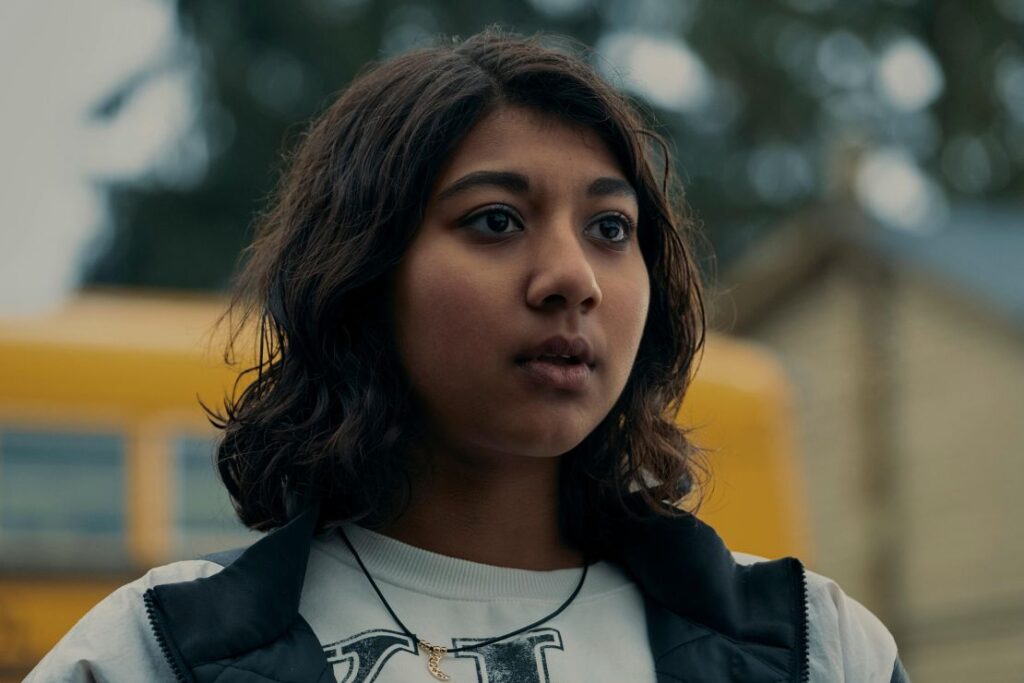
Under the Bridge is a true crime series done with respect and tastefulness. It’s painful yet engaging and in no way sensationalistic. That’s not an easy feat to pull off with a story based on a horrific crime, but Under the Bridge creator Quinn Shepard and showrunner Samir Mehta treated the victims, including young Reena Virk, with respect.
Instead of blowing up headlines for more streaming hours, they found the nuances and questions in those headlines. As storytellers, they express curiosity and empathy. It’s palpable from beginning to end. Recently, the two storytellers spoke with Immersive Media about how they handled a truce crime series with palpable care and honesty.
Let’s begin with the ending. How’d you both decide on the final scene with Rena’s parents?
Mehta: We definitely knew we wanted to end with Rena in some way. Obviously, we have the flashback timeline, but to end on Rena in the flashback timeline is to end at the worst moment of her life. We just did not want that to be our final moment with her. We wanted something a little more tender and to acknowledge what Sumin and Manjit were going to have to just face the rest of their lives, really never recovering from this loss because you never really do.
But we wanted to show maybe just a tiny, minuscule moment of growth in terms of, okay, maybe in death I’ll do something I wish I did in life, which is try to understand my daughter, what she was interested in, where she might be coming from. We wanted there to be this gesture of understanding as a final moment, but one that also felt real for who the people really were.
Even when you lose someone, you can still get to know them in a way, I liked that note you both hit. For the beginning, you have so much to set up with that structure, all these characters and this town. Structurally, what were the biggest challenges with the first three episodes?
Shepard: I think it was challenging because the book and the research are on a slightly different timeline than the show moves at. Almost like half the book takes place over a course of two days, and then the other half takes place over almost seven years.
For the series, we knew we were going to have to condense time a little bit and streamline and condense some of the characters, so that we could get through those plot points in a way that made sense and we didn’t end up with a 40 person cast.
Mehta: There’s a murder mystery element and there’s an investigation, so our big question was, “How long do we want to stretch that out?” Fundamentally, we just didn’t think it made sense to craft this as a whodunit. Suddenly you’re three episodes in and that part is eliminated.
It was a very deliberate move in terms of our relationship with the audience where you get the answer way sooner than you think, which then makes you actually on the edge of your seat, ideally going, “Well, wait a second, what is this show? I already know the answer. ” And then we go to the ’70s, so then that transforms the show again, and then we’re in a cat and mouse.
So, it was very purposeful for us to use the audience expectation and take the conventions of the genre and then subvert them to actually make the experience more thrilling.
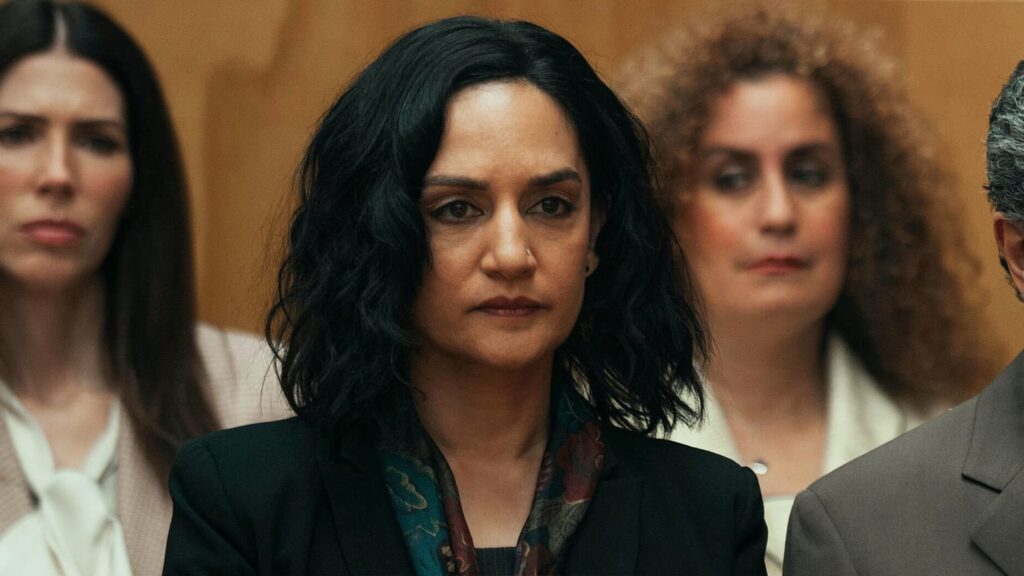
In the story, Rebecca asks herself those questions of, how do you tell the story? Can you even be objectively telling it? For yourselves, what questions did you find yourself asking yourselves as storytellers about responsibility and subjectivity through this process?
Shepard: We unpack a lot of what we were asking ourselves in the show, especially as it gets into the last few episodes. I think it actually got very personal because so much of working on this was about interrogating the ethics of true crime itself and what it means to insert yourself into a tragedy. By making the show, we were inserting ourselves, just however many years later.
We felt the ripple effect of that and the pressure of the stakes of it, the fact that these were real people and that Rena was a real girl who suffered this unimaginable tragedy. And yet, we were trying to advocate for empathy, talk about restorative justice, and all these huge themes while also being respectful of the fact that this crime happened and not making excuses for it.
I can’t understate how much that affected the creative process. For honestly everyone who worked on the show, there was just so many conversations about our own responsibility in it. If we would have a conflict of opinion, we would try to put it into the show. You can’t be fully objective, but you can at least unpack your own biases in a character. We would kind of all try to put our perspectives into the show, so that the audience can go like, “I have to figure out where I fall in all of this.”
Any specific examples of conflict of opinions that made their way into the show?
Mehta: I think the case has a lot of controversy associated with it just in terms of where people’s sympathies lie. The show wants to take the perspective that any human being actually is deserving of sympathy just by virtue of that is the most compassionate version of a society. But obviously, that can trigger a response in terms of people not wanting to have sympathy for people that they naturally have an aversion to. That’s human and natural.
I think especially in a kneejerk response, someone who’s really wronged you or someone who’s done something really horrible, it makes sense that you would have a hatred in your heart for them. But taking the sort of wisest, most kind of conscious high-level view, ultimately we want everybody to be moving toward more compassion, more kindness.
Also, timing is everything. You can’t demand that someone who’s in pain just get it right away. You can’t say, “I know this person did something horrible to you, but just understand where they were coming from and do it right now.” It’s not an acceptable ask.
So, it was taking a lot of the conflict around the immediacy of the wound and what is right to expect of people. A lot of the conversation conflict starts there, but we wanted the show to illustrate that over time. Hopefully, we’re sending a larger message around empathy.
Shepard: I agree with everything that Samir is saying, and I also think that in practicality, in terms of personal opinion, that would almost unfold with every character. Warren [Glowatski] is a really good example of a character that I struggled with the most in terms of going back and forth.
You read Rebecca’s book, which is her perspective, but is also true. Everything she publishes is true, but is also through her eyes and you really fall in love with this kid who did this horrible thing. You feel empathy for him. Getting to know Rebecca and hearing about him through her, I felt a certain way.
It was different for me than how I felt when I started listening to his interviews that she had taped with him, reading his transcripts, and forming my own opinions of him. I found myself really angry. I was like, “Oh, I’m reaching a conclusion that’s different from the book, that’s different from Rebecca.” I had to process that and then go, “I’m not more right if I’m angry than if I’m not angry.” Both versions of reaction to this are valid.
And so, that’s where we would always come back to and why the show was designed to have so many foiling perspective. Being furious with Warren to the point where you can’t forgive him, and seeing anything more to him than what he did, both is a valid perspective. It was all valid because it’s like what Samir said, it’s this puzzle of humanity of every human being deserving of sympathy. We would try to unpack that in the show.
Mehta: There’s a line in the finale that’s hiding the theme in plain sight. It comes in the form of Dusty (Aiyana Goodfellow) on the stand, but she says, “We were all a part of this.” Very deliberately, the attorney repeats it a couple times. It lands on Rebecca’s face as she’s registering her participation in this whole thing. It is a critical theme for us, the fact we were all a part of this. It feels a little uncomfortable to consider to make a specific point in terms of the difference of opinion.
Obviously, we would never blame the victim. We would never blame the family, but we did find it a worthwhile conversation to go, okay, what were the circumstances inside Rena’s house that maybe compelled her to go seek friendship in the people who would ultimately become her killers? We would never blame the parents for that, but I don’t think it’s victim blaming to at least consider Rena’s home life. It is just adding dimension to her character and the whole case, letting us take a step back and look at the whole thing comprehensively.
But of course, you can’t really get to that level of depth if someone is going to say, which is inevitably going to happen, “I don’t even want to hear about you saying a single bad thing about the parents. They’ve been through enough.” That’s true. We, of course, believe that as well. We don’t think it’s negative to be truthful and examine it as it actually was, though.
I did want to ask more about Rebecca Godfrey, Quinn. During that time you spent with her, did you have questions for her about, okay, this is how you felt at the time but how do you reflect on it now? Did her reflections maybe influence how you told the story as well?
Shepard: For sure. I think probably the most obvious of that and the most present in the way we break the arc in the show is her feelings on Warren. Even in the time that I knew her, the way that she spoke about why they were close changed. Look, she was very generous with me. Rebecca went through a horrible tragedy when she was a kid with the loss of her brother. I think it fundamentally shifted something in the way that she saw herself and the world, and that echoed through a lot of the work that she did in her career of advocating for misunderstood teenagers or angry teenagers. I think she saw a lot of herself actually in the perpetrators of, not that she was herself, somebody who had killed, but that she understood what it was like to have a lot of anger.
After almost three years of knowing someone, she definitely shared a lot with me about where she ultimately landed in terms of seeing pieces of herself in Warren, and that became the core arc of her character. Even if certain scenes, some of their dialogue is somewhat based on reality, somewhat based on fiction, it was always to serve this greater arc of I think what she almost herself didn’t fully understand the relationship until the end of it.
Anything about her mannerisms or just the way she’d express herself you wanted to get right?
Shepard: Yeah, I think in my very first interview with her, I wrote down that she always spoke very thoughtfully. She would pause a lot because it felt like she didn’t want to say the wrong thing. She was almost writing as she spoke. Tere were little things like that, I don’t know.
There was something about the way she wrote, too. Obviously I got to know her when she was a bit older. She was in her fifties, but when she wrote the book, she was in her twenties. The voice that she had in her personal diaries that she shared with us from that age was so distinctive and fun. She would be incensed about something and she would write about it, so we were like, oh, this is juicy and fiery. We would always kind of take little pieces of that and try to sew that into her dialogue.
How did The Wire, in particular, inspire you both?
Mehta: Day one, when Quinn and I first met to talk about what the show will be in particular season four, because it is all about the young kids. Just immediately I was like, there’s something about the tragedy. The Wire was built as a Greek tragedy, so the second I heard about this real crime, it felt like we to bring that element in, especially because these kids think that they’re in a gang. The way The Wire is built, where the longer you watch it, as horrible as some of the characters are, you just understand how they’re locked in the game, as they call it, why they are.
Everybody is sort of trapped inside of this existence that they didn’t necessarily choose or want. But once in it, you have to just play your role to the best of your ability, even if that’s sometimes pure evil. I just found that fascinating, and we just felt we had to bring a lot of those elements into this show.
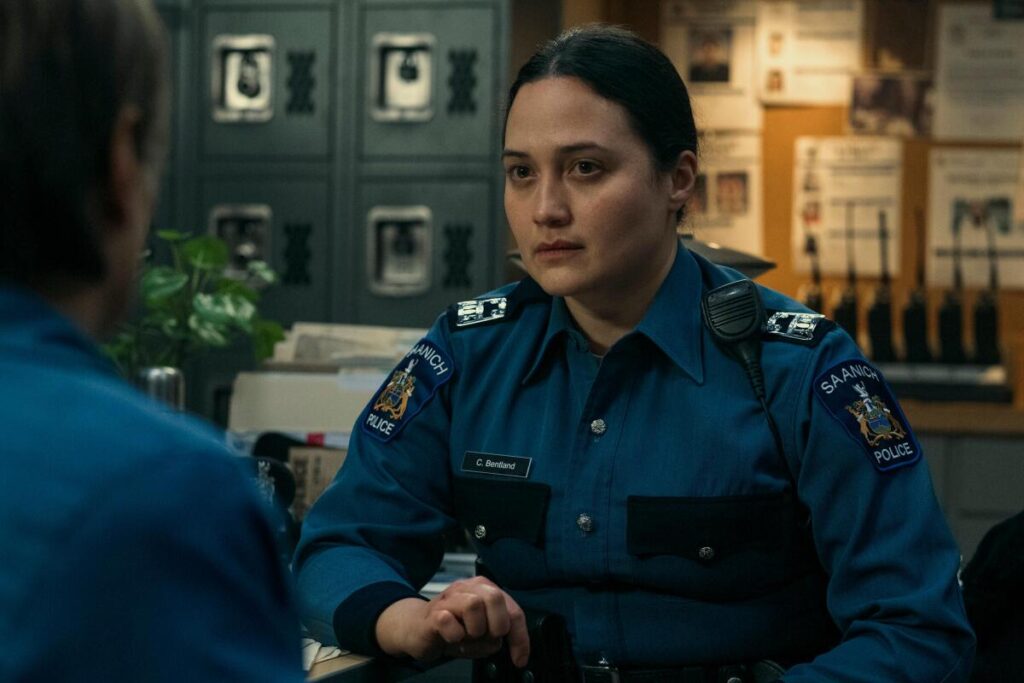
After asking yourselves these questions about your responsibilities as storytellers, how do you think you both changed after making Under the Bridge?
Shepard: It made me very aware of the responsibility of storytellers to an alarming degree. What we had to confront in ourselves and in the responsibility of it, for me at least, I know it’s the first and last true crime I’m ever going to do. It’s a huge undertaking to take on true crime, and even if your goals are really positive and you stick to them, there’s ripple effects to doing a true story. There’s so many real people involved, something’s going to hit someone. I think that’s not something I want to do again.
But this story meant a lot to me, and it felt very important to tell. I’m still proud that I did it, but it made me very conscious of… it means so much to someone, and it’s what I think about now. I can’t really watch docs anymore, I can’t stop thinking about the person sitting behind the camera. I think something about it shifted. I just watched this documentary about beekeepers and, sorry-[Samir laughs].
[Laughs] It’s with Jason Statham. It’s a really crazy doc.
Shepard: Oh my God, it’s called The Beekeeper. It’s crazy that it’s true. The doc was called Honeyland. It was about this woman living pretty much in poverty and taking care of her mom and beekeeping. I honestly could not stop thinking about the person sitting behind the camera and literally Googling, well, if the character starving or trying to get food, and the filmmaker has food, does the filmmaker give them food? Something about it shifted for me where I was like, I don’t know. It’s a little too close to home maybe to get that into people’s lives.
Mehta: I think I’m retiring from true crime as well. I think working in our business, I don’t agree that there needs to be this tension, but there is a tension between the requirement to entertain and maybe the desire on our part to be artful. Often these things are presented as mutually exclusive; it’s just simply not true.
It’s reductive to be so binary about it, but it is a challenge to try to do both. But I think working on this show really tested the limits of that. It helped both of us hopefully realize how to do that well and take that into the next thing.
Under the Bridge is now available on Hulu.


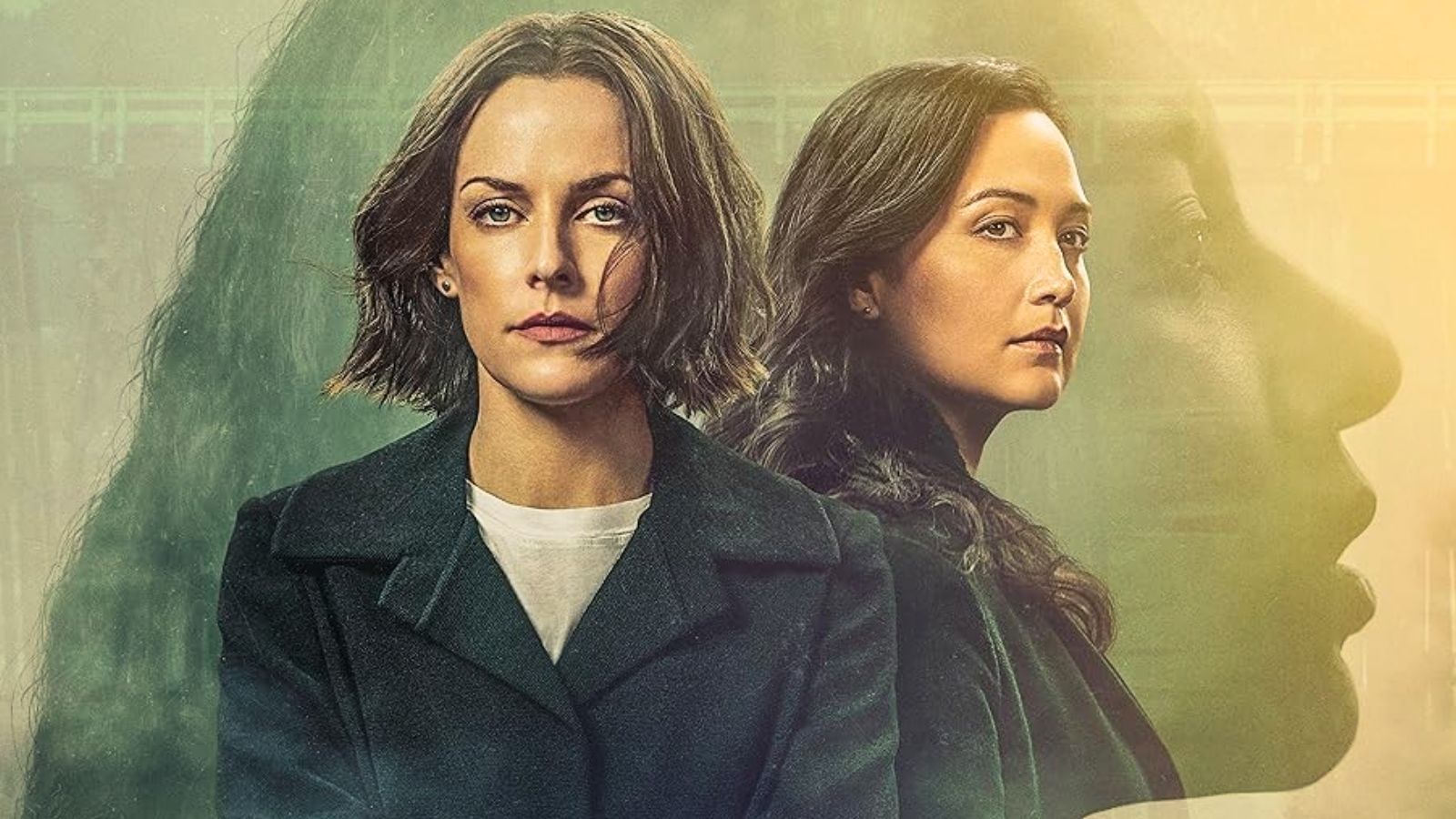


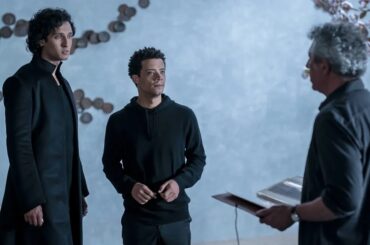
![‘Shōgun’ Cinematographer Sam McCurdy Breaks Down Episodes 9 & 10 [Part 1]](../wp-content/uploads/2024/07/hiro-370x245.jpeg)